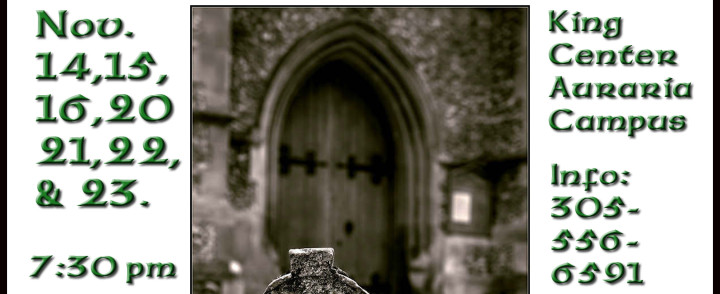‘Stained Glass at Samhain’ Play will to make U.S. Premiere in Denver!
By Rodger Hara –
For over 200 years, societies around the world (including the United States) operated institutions called “Magdalene Asylums” in which prostitutes, mentally ill and/or handicapped women, orphan girls, women running from abusive relationships and girls thought to be too pretty and flirtatious were often placed for “rehabilitation” or to seek penance for their sins, real and imagined. In many of those facilities, women were free to leave and often did so after they were determined to be “rescued”.
Originally, the asylums in Ireland were Protestant institutions and in the early years of the 19th century, the Catholic Church appropriated their operation and converted them from short term “recovery” centers to long-term institutions whose existence was known to much of a society that knew little of what happened inside them. They became the infamous “Magdalene Laundries”, named after St. Mary Magdalene and the laundry work done to pay for operations as they received no public support. For many, death was the only way to escape.
In 1993, a former laundry on Leeson Street in Dublin southeast of St. Stephen’s Green was sold for redevelopment. In the process of demolition of the building and clearing of the site, the unmarked graves of 155 women were discovered. This led to intense scrutiny of the records, testimony from women who had been “penitents” in the laundries and came forth after the discovery, closure of the last laundry in Ireland in 1996 and the placing of a monument there called the “State Meant” memorial. The outcry led to an 18-month long official inquiry by the Irish government that resulted in a report that found the state guilty of turning a blind eye to the abuses and a public apology on behalf of an embarrassed state by Taoiseach Enda Kenney on February 19, 2013.
It also led Patricia Burke Brogan, born in County Clare and now living in Galway City to write a play called “Eclipsed” in the late 1980’s that presented a picture of life inside a laundry from the perspective of one of the penitents. A former nun whose experience working as staff in a laundry led her to resign from her position at the laundry and leave her orders, she had the direct knowledge to write the play. It was first produced in 1992 and received a Fringe First at the Edinburgh Theatre Festival that year and the Moss Hart Award in the US in 1994.
Brogan was also inspired to write a play in 2001 that bookends the story of the laundries with the perspective of a nun who worked in one. That play, “Stained Glass at Samhain” will have its American premiere in Denver this month. Directed by Eileen Kearney, an adjunct professor in the Theatre Department at the University of Colorado Denver, the play uses the destruction of a fictional laundry as a metaphor for the destruction of the laundry system and to make some powerful statements about the physical and mental abuses visited upon the women, the effect upon their minders and the spiritual healing and reconciliation of those involved. Kearney, with roots in Mayo, Roscommon and Cork, discovered the works of Brogan during her research into the lives of Irish women playwrights for her Master’s thesis while in Ireland.
The play stars Chip Winn Wells, a local actress with extensive stage and television experience as Sister Luke and features five UCD students filling out the rest of the cast. Performances will be November 14, 15, 16, 20, 21 and 23 at 7:30 PM in the King Center Theatre on the UC Denver campus. Judy Murphy, Arts and Lifestyle writer for the Connacht Tribune will be in Denver for the performance and lead a panel discussion after the performance on the 20th. For information and tickets, call 303.352.3883 or go to www.ahec.edu/kingcenter . In addition, there will be a free staged reading of scenes from” Eclipsed” and “Stained Glass at Samhain” in The Burns Room of the Celtic Tavern Downtown at 6 PM on November 18th . (See also Do Penance or Perish: Magdalene Asylums in Ireland by Frances Finnegan, Ireland’s Magdalene Laundries and the Nation’s Architecture of Containment by James M. Smith and Sex in a Cold Climate, documentary by Steve Humphries for more information.)
………………………………
Side Bar:
“Philomena”
In 1952, an unmarried and very pregnant Philomena Lee was sent by her father to Sean Ross Abbey in Roscrea, County Tipperary where she gave birth to a boy. She was forced to surrender the baby to the Church who arranged his adoption by an American family when he was three years old. Lee was sent to work in a home for delinquent boys operated by the Church in Liverpool. She later married, had two more children and late in life began searching for her son. At 11:30 AM on November 17th, as part of the starz Denver Film Festival, the UK movie “Philomena”, starring Dame Judi Dench as Philomena Lee will play at the Elaine Wolfe Theatre in east Denver. Based on the book “The Lost Child of Philomena Lee” by Michael Sixsmith, the movie tells the story of Lee’s search for and discovery of her son fifty years after his birth, the barriers thrown up by the Church and features a performance by Dench that is already generating Oscar buzz.




